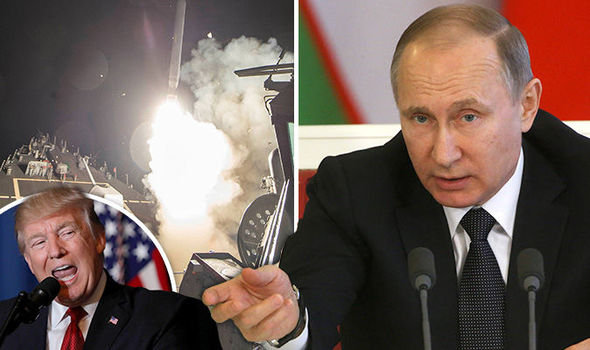
‘Are You Even Sane People?’
(Russia) on 14 December 2017
by Aleksandr Vedrussov (link to original)
One would think, what could be simpler? Yet, over the years that Americans have enjoyed global domination, they have grown too accustomed to playing “zero-sum games” in which U.S. advantages and benefits can be assured only through Russia’s losses and defeats. Put simply, if Moscow wins, Washington loses. And vice versa.
It’s for this very reason that all our appeals to adopt mutually beneficial solutions in the international arena run up against such rigid opposition from the American neo-conservative establishment.
To the exact extent that Russia is a global peacekeeper that tries to the best of its ability and as far as possible to stamp out hotbeds of tension in various regions, the U.S. is a warmonger that seeks to destabilize the situation across the entire globe.
To the exact degree that Moscow benefits from global stability and an overall architecture of indivisible security, Washington places its bet on stirring up international conflicts.
The Russian president, in fact, speaks about this plainly. During today’s press conference, Vladimir Putin very clearly explained the destructiveness and incoherence of U.S. actions, using the example of North Korea’s nuclear program: American hawks undermined the negotiation process at the exact moment that it became clear it was about to succeed and North Korea would strike a long-term compromise beneficial to all global mediators involved in the process. And beneficial to the world as a whole. “Well, why did you do that?” asked the Russian president, justifiably puzzled.
Now, when it’s becoming even more complicated to loosen the knots of the most serious of conflicts on the Korean Peninsula without Moscow’s mediation, what is Washington doing? It’s actually putting Russia on the same “axis of evil” with North Korea and Iran in the worst Reaganesque traditions of the Cold War. “Are you even sane people?” inquires the Russian leader, perhaps no longer even expecting to get an intelligible response from our “American friends.”
Meanwhile, the U.S. continues to sculpt from Russia the irrational form of an aggressive enemy of the “civilized world,” even though in reality our country consistently takes peacekeeping, defensive positions in the international arena.
It isn’t Russia but the Americans who unilaterally withdrew from the Anti-Ballistic Missile Treaty.
It isn’t Russia but the Americans who are undertaking information and propaganda work for a possible U.S. withdrawal from the Intermediate−Range Nuclear Forces Treaty, in fact already violating the treaty’s parameters by deploying in Romania the Aegis Ballistic Missile Defense System, which could easily be retrofitted with medium-range missiles.
It isn’t Russia but the Americans who are seeking out options for undermining START III, which to them is “disadvantageous and unnecessary,” and pushing forward with their borderline insane ideas of a multiplex buildup of their nuclear triad.*
“We ourselves aren’t going to withdraw from anywhere to anywhere,” the head of state confidently affirms. And he has something to back up his words. For example, this year Russia, unlike the U.S., completed the liquidation of its entire chemical weapons arsenal ahead of schedule, wholly fulfilling its international obligations in the sphere of disarmament and non-proliferation of weapons of mass destruction. And we’re prepared to disarm even further. But only on a reciprocal basis ⎯ otherwise it would no longer be disarmament but capitulation.
At the same time, Russia is surprisingly successful at ensuring its security and the combat readiness of our armed forces without being drawn into an arms race. While about $46 billion is earmarked for defense needs next year in the Russian budget, the U.S. defense budget will reach a historical world record of $700 billion. “Feel the difference,” sneers President Putin.
And it’s not only we who feel the difference but our allies throughout the world as well. It’s no accident the Russian head of state separately noted the importance of a “strategic partnership for the long, historical perspective” with China, which is gradually taking the place of the U.S. in international affairs. The only difference is that with such a global ally, we’ll actually be able to reach agreement on the pragmatic basis of a multipolar world order ⎯ to the countries’ mutual benefit. And without any destructive zero−sum games.
*Editor’s note: START III, (Strategic Arms Reduction Treaty) was a proposed bilateral nuclear disarmament treaty between the United States and Russia meant to drastically reduce the deployed nuclear weapons arsenals of both countries and continue weapons reduction efforts begun under previous START negotiations. The START III treaty was never signed.


